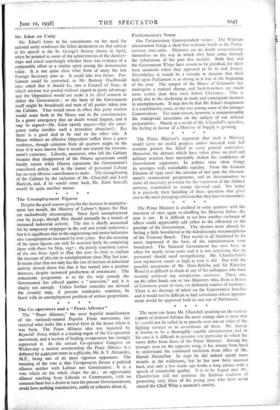Mr. Eden on Unity Mr. Eden's letter to his constituents
on the need for national unity reinforces his fuller declaration on that subject at his speech at the St. George's Society dinner in April, when he pointed to some of the achievements of the dictator- ships and asked searchingly whether there was evidence of a comparable effort or a similar spirit among the democracies today. It is not quite clear what form of unity the late Foreign Secretary aims at. It could take two forms. Par- liament could be converted, as Mr. Ramsay MacDonald once asked that it should be, into a Council of State, in which wisdom was pooled without regard to party advantage and the Opposition would not make it its chief concern to defeat the Government ; or the basis of the Government itself might be broadened and men of all parties taken into the Cabinet. That would mean in effect that party warfare would cease both in the House and in the constituencies. In a grave emergency that no doubt would happen, and it may be argued—Mr. Eden openly argues—that the emer- gency today justifies such a procedure abundantly. But there is a good deal to be said on the other side. A House without an effective Opposition suffers from a grave weakness, though criticism from all quarters might be the freer if it were known that it would not imperil the Govern- ment's existence. Liberals, moreover, who left the Cabinet because they disapproved of the Ottawa agreements could hardly return while Ottawa represents the Government's considered policy, and in the matter of personnel Labour has no very obvious contribution to make. The strengthening of the Cabinet by the inclusion of Mr. Churchill and Lord Harlech, and, if he would come back, Mr. Eden himself, would be quite another matter.










































 Previous page
Previous page